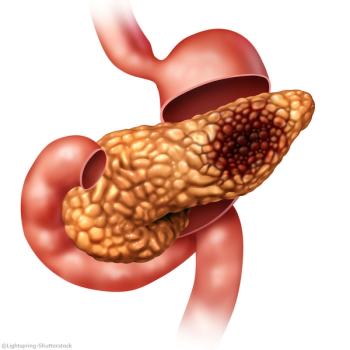
Oncology NEWS International
- Oncology NEWS International Vol 13 No 3
- Volume 13
- Issue 3
Early Results Promising for Autologous HSP Vaccine in Pancreatic Cancer
This special "annual highlights" supplement to Oncology News International is a compilation of some of the major advances in the management of gastrointestinal cancers during 2003–2004, as reported in ONI. Guest editor Dr. James L. Abbruzzesecomments on the reports included herein and discusses advances in the clinical management of GI cancers, with a focus on developments in targeted therapy, newcombinations, adjuvant therapy, and what to watch for in 2004.
COPENHAGEN, Denmark-Preliminary work with a cancer vaccinederived from heat-shock proteins(HSPs) taken from the patient's owntumor has led to impressive early resultsin resected pancreatic cancer.Robert G. Maki, MD, presented thefindings at the European Cancer Conference(ECCO 12, abstract 48).Cancer vaccines based on autolo-gous heat-shock proteins are of interestbecause they can carry a diversearray of peptides representing an individualcancer against which a patientcan be vaccinated, said Dr. Maki, ofthe Division of GI Oncology, Departmentof Medicine, Memorial Sloan-Kettering Cancer Center."This heat-shock-protein-basedcancer vaccine contains the antigenicfingerprint of the patient's particularcancer, and is designed to direct thebody's immune system to target anddestroy only cancer cells bearing thatspecific antigenic fingerprint," he said.The phase I study included 10 evaluablepatients with resected pancreaticadenocarcinoma given an autologousvaccine (heat-shock proteinpeptide complex-96). Although theaverage survival after surgery for pancreaticcancer is 14 to 15 months, patientsin this trial had a median survivalof 2.5 years, Dr. Maki reported.One patient was still alive and withoutdisease after 5 years, and two otherpatients were alive and disease-freeafter more than 2 years following treat-ment. There was no significant observedtoxicity associated with the vaccinetherapy.The trial enrolled patients who hadundergone pancreatic resection andwere considered disease-free at vaccination.None had received chemotherapyor radiation therapy. Within8 weeks of surgery, they began treatment:one vaccination of 5 μg HSPPC-96 derived from their own tumoreach week for 4 weeks.During vaccination, patients werefollowed by ELISpot assay of autologousT cells against antigen-presentingcells loaded with autologous HSPPC-96. After the vaccination, patientswere followed clinically by CT scanand CA-19-9 every 3 months for 1 yearfor evidence of recurrence and aboutevery 6 months thereafter."What is notable is the duration ofthe survival observed in this study,since more than 90% of patents withpancreatic cancer die within 2 years ofdiagnosis despite surgical treatment,"Dr. Maki said. "Combined with thelack of dose-limiting toxicity observedin this trial, these preliminary resultsare promising and support the furtherevaluation of cancer vaccines."Dr. Maki warned, however, thatphysicians and patients should not gettoo excited about the results of thisinitial research as it is too early to tellwhether it will be possible to createpersonalized cancer vaccines for allpancreatic cancer patients, and alsobecause the patients involved in thistrial had been carefully selected."We may be biased in who we selectedfor this study. Only patientswho could have an operation wereeligible. Furthermore, we screened outthose who had evidence of tumorspread before they entered the study.Perhaps, just by chance, we got a fewpeople who were destined to do well,"Dr. Maki said. "We need a properrandomized study to determine thevaccine's usefulness."He pointed out that there were initialproblems with the vaccine's manufacturingprocess, and the study wasdelayed half way through to improvethe vaccine-making process. "Theproblem is that the pancreas makesspecific digestive enzymes that destroyproteins," Dr. Maki said. "In otherwords, the pancreatic tumor cellsthemselves can destroy the vaccinesyou are trying to make if you do nothandle the tumor tissue carefully andquickly." With improvements in thevaccine-purification process, he said,most patients enrolled in the studywere able to receive the vaccine.Other Cancers
The results from the phase I pancreaticcancer trial are "consistent withwhat we have observed in trials of thisvaccine with other cancers," Dr. Makisaid. The vaccine is being tested inphase III trials in renal cell carcinomaand metastatic melanoma, and is alsobeing studied in gastric cancer, non-Hodgkin's lymphoma, and colorectalcancer.New York-based Antigenics Inc.,the company sponsoring these trials,has been granted fast track and orphandrug designations from the FDAfor HSPPC-96 (Oncophage) in bothmetastatic melanoma and renal cellcarcinoma.
Articles in this issue
almost 18 years ago
Panitumumab effective in normal KRAS subsetover 21 years ago
XELOX Combination Is ‘Highly Active’ in Biliary System Cancersalmost 22 years ago
FDA Approves Erbitux for Advanced Colon Caalmost 22 years ago
FDA Approves Alimta/Cisplatin for Malignant Mesotheliomaalmost 22 years ago
Topotecan/Cisplatin Improves Cervical Cancer Survivalalmost 22 years ago
Multigene Assay Predicts Breast Ca Recurrencealmost 22 years ago
2004 Sees FDA Approval of Two Tumor Growth Inhibitors for Colorectal Canceralmost 22 years ago
Neoadjuvant Therapy Is Promising for Locally Advanced Gastric CancerNewsletter
Stay up to date on recent advances in the multidisciplinary approach to cancer.




































